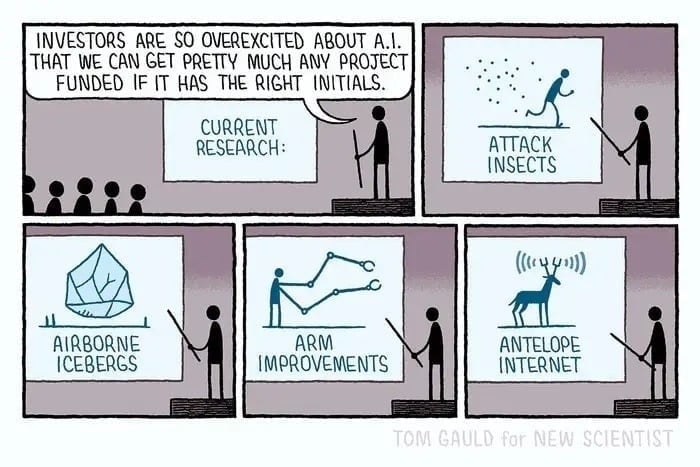As a fervent AI enthusiast, I disagree.
…I’d say it’s 97% hype and marketing.
It’s crazy how much fud is flying around, and legitimately buries good open research. It’s also crazy what these giant corporations are explicitly saying what they’re going to do, and that anyone buys it. TSMC’s allegedly calling Sam Altman a ‘podcast bro’ is spot on, and I’d add “manipulative vampire” to that.
Talk to any long-time resident of localllama and similar “local” AI communities who actually dig into this stuff, and you’ll find immense skepticism, not the crypto-like AI bros like you find on linkedin, twitter and such and blot everything out.
For real. Being a software engineer with basic knowledge in ML, I’m just sick of companies from every industry being so desperate to cling onto the hype train they’re willing to label anything with AI, even if it has little or nothing to do with it, just to boost their stock value. I would be so uncomfortable being an employee having to do this.
For sure, it seems like 90% of ai startups are nothing more than front end wrappers for a gpt instance.
They’re all built on top of OpenAI which is very unprofitable at the moment. Feels like the whole industry is built on a shaky foundation.
Putting the entire fate of your company in a different company (OpenAI) is not a great business move. I guess the successful AI startups will eventually transition to self-hosted models like Llama, if they survive that long.
Most projects I’ve been in contact with are very aware of that fact. That’s why telemetry is so big right now. Everybody is building datasets in the hopes of fine tuning smaller, cheaper models once they have enough good quality data.
My company is realizing that hosting a model which will be private, cost-effective, and performing better than traditional algorithms is like finding a unicorn. Few months back, the top execs were jumping around GenAI like a bunch of kids. Fortunately, the Sr. research head beat some sense into them.
You’re lucky there’s a higher up that could talk down the even higher ups. Though, sometimes it’s not even about the r&d teams.
I saw company wide HR educational emails or courses telling you how to improve you work quality/efficiency, and one of them tells us to “research AI” and learn how to utilize it, talking about how great it is and improved the work efficiency by 30%. Sure, it has its uses, but I won’t go touting how great it is. And with how ChatGPT works, you have to be the biggest idiot in the world to upload all your sensitive stuff to ChatGPT just for it to make a spreadsheet faster. But without these disclaimers in the email, I doubt regular clerical staff knows about this, and it’s extremely dangerous.
What kind of use-cases was it, where you didn’t find suitable local models to work with ? I’ve found that general “chatbot” things are hit and miss but more domain-constrained tasks (such as extracting structured entities from unstructured text) are pretty reliable even on smaller models. I’m not counting my chickens yet as my dataset is still somewhat small but preliminary testing has been very promising in that regard.
What kind of use-cases was it, where you didn’t find suitable local models to work with ?
Any time you ask very domain specific questions; eg “i have collected some soil samples from the mesolithic age near the Amazon basin which have high sulfur and phosphorus content compared to my other samples. What factors could contribute to this distribution?”, both of-the-shelf local models & OpenAI fail.
The main reason is because these models are not trained on highly-specialized domains of text. Sometimes the models start hallucinating and which reduces our trust upon them.
As someone who was working really hard trying to get my company to be able use some classical ML (with very limited amounts of data), with some knowledge on how AI works, and just generally want to do some cool math stuff at work, being asked incessantly to shove AI into any problem that our execs think are “good sells” and be pressured to think about how we can “use AI” was a terrible feel. They now think my work is insufficient and has been tightening the noose on my team.
This. Exactly.
TSMC are probably making more money than anyone in this goldrush by selling the shovels and picks, so if that’s their opinion, I feel people should listen…
There’s little in the AI business plan other than hurling money at it and hoping job losses ensue.
TSMC doesn’t really have official opinions, they take silicon orders for money and shrug happily. Being neutral is good for business.
Altman’s scheme is just a whole other level of crazy though.
Seriously, I’d love to be enthusiastic about it because it’s genuinely cool what you can do with math.
But the lies that are shoved in our faces are just so fucking much and so fucking egregious that it’s pretty much impossible.
And on top of that LLMs are hugely overshadowing actual interesting approaches for funding.
I think we should indict Sam Altman on two sets of charges:
-
A set of securities fraud charges.
-
8 billion counts of criminal reckless endangerment.
He’s out on podcasts constantly saying the OpenAI is near superintelligent AGI and that there’s a good chance that they won’t be able to control it, and that human survival is at risk. How is gambling with human extinction not a massive act of planetary-scale criminal reckless endangerment?
So either he is putting the entire planet at risk, or he is lying through his teeth about how far along OpenAI is. If he’s telling the truth, he’s endangering us all. If he’s lying, then he’s committing securities fraud in an attempt to defraud shareholders. Either way, he should be in prison. I say we indict him for both simultaneously and let the courts sort it out.
“When you’re rich, they let you do it.”
-
I really want to like AI, I’d love to have an intelligent AI assistant or something, but I just struggle to find any uses for it outside of some really niche cases or for basic brainstorming tasks. Otherwise, it just feels like alot of work for very little benefit or results that I can’t even trust or use.
It’s useful.
I keep Qwen 32B loaded on my desktop pretty much whenever its on, as an (unreliable) assistant to analyze or parse big texts, to do quick chores or write scripts, to bounce ideas off of or even as a offline replacement for google translate (though I specifically use aya 32B for that).
It does “feel” different when the LLM is local, as you can manipulate the prompt syntax so easily, hammer it with multiple requests that come back really fast when it seems to get something wrong, not worry about refusals or data leakage and such.
Attractive. You got some pretty solid specs?
Rue the day I cheaped out on RAM. soldered RAMmmm
Soldered is better! It’s sometimes faster, definitely faster if it happens to be lpddr.
But TBH the only thing that really matters his “how much VRAM do you have,” and Qwen 32B slots in at 24GB, or maybe 16GB if the GPU is totally empty and you tune your quantization carefully. And the cheapest way to that (until 2025) is a used MI60, P40 or 3090.
I receive alerts when people are outside my house, using security cameras, Blue Iris, CodeProject AI, Node-RED and Home Assistant, using a Google Coral for local AI. Entirely local - no cloud services apart from Google’s notification system to get notifications to my phone while I’m not home (which most Android apps use). That’s a good use case for AI since it avoids false positives that occur with regular motion detection.
I’ve been curious about google coral, but their memory is so tiny I’m not sure what kinds of models you can run on them
A lot of people use them for the use case I described (object detection for security cameras), using either Blue Iris or Frigate. They work pretty well for that use case.
Wake word detection is a good use case too (eg if you’re making your own smart assistant).
The Coral site lists a few use cases.
The saddest part is, this is going to cause yet another AI winter. The first few ones were caused by genuine over-enthusiasm but this one is purely fuelled by greed.
The AI ecosystem is flooded, we need a good bubble pop to slow down the massive waste of resources that our current info-remix-based-on-what-you-will-likely-react-positively-to shit-tier AI represents.
Agreed that’s why it’s so dangerous. These tech bros are going to do damage with their shitty products. It seems like it’s Altman’s goal, honestly.
He wants money/power, and he is getting it. The rest of the AI field will forever be haunted by his greed.
After getting my head around the basics of the way LLMs work I thought “people rely on this for information?”, the model seems ok for tasks like summarisation though
I don’t love it for summarization. If I read a summary, my takeaway may be inaccurate.
Brainstorming is incredible. And revision suggestions. And drafting tedious responses, reformatting, parsing.
In all cases, nothing gets attributed to me unless I read every word and am in a position to verify the output. And I internalize nothing directly, besides philosophy or something. Sure can be an amazing starting point especially compared to a blank page.
It’s good for coding if you train it on your own code base. Not great for writing very complex code since the models tend to hallucinate, but it’s great for common patterns, and straightforward questions specific to your code base that can be answered based on existing code (eg “how do I load a user’s most recent order given their email address?”)
It’s wild when you only know how to use SELECT in SQL, but after a dollar worth of prompting and 10 minutes of your time, you can have a significantly complex query you end up using multiple times a week.
the model seems ok for tasks like summarisation though
That and retrieval and the business use cases so far, but even then only if the results can be wrong somewhat frequently.
It’s selling the future, but nobody knows if we can actually get there
It’s selling an anticompetitive dystopia. It’s selling a Facebook monopoly vs selling the Fediverse.
We dont need 7 trillion dollars of datacenters burning the Earth, we need collaborative, open source innovation.
The first part is true … no one cares about the second part of your statement.
TSMC’s allegedly calling Sam Altman a ‘podcast bro’ is spot on, and I’d add “manipulative vampire” to that.
What’s the source for that? It sounds hilarious
When Mr. Altman visited TSMC’s headquarters in Taiwan shortly after he started his fund-raising effort, he told its executives that it would take $7 trillion and many years to build 36 semiconductor plants and additional data centers to fulfill his vision, two people briefed on the conversation said. It was his first visit to one of the multibillion-dollar plants.
TSMC’s executives found the idea so absurd that they took to calling Mr. Altman a “podcasting bro,” one of these people said. Adding just a few more chip-making plants, much less 36, was incredibly risky because of the money involved.
Ya, it’s like machine learning but better. That’s about it IMO.
Edit: As I have to spell it out: as opposed to (machine learning with) neural networks.
I mean… it is machine learning.
It’s also neural networks, and probably some other CS structures.
AI is a category, and even specific implementations tend to use multiple techniques.
Well there is a very specific architecture “rut” the LLMs people use have fallen into, and even small attempts to break out (like with Jamba) don’t seem to get much interest, unfortunately.
Sure, but LLMs aren’t the only AI being used, nor will they eliminate the other forms of AI. As people see issues with the big LLMs, development focus will change to adopt other approaches.
There is real risk that the hype cycle around LLMs will smother other research in the cradle when the bubble pops.
The hyperscalers are dumping tens of billions of dollars into infrastructure investment every single quarter right now on the promise of LLMs. If LLMs don’t turn into something with a tangible ROI, the term AI will become every bit as radioactive to investors in the future as it is lucrative right now.
Viable paths of research will become much harder to fund if investors get burned because the business model they’re funding right now doesn’t solidify beyond “trust us bro.”
the term AI will become every bit as radioactive to investors in the future as it is lucrative right now.
Well you say that, but somehow crypto is still around despite most schemes being (IMO) a much more explicit scam. We have politicans supporting it.
Sure, but those are largely the big tech companies you’re talking about, and research tends to come from universities and private orgs. That funding hasn’t stopped, it just doesn’t get the headlines like massive investments into LLMs currently do. The market goes in cycles, and once it finds something new and promising, it’ll dump money into it until the next hot thing comes along.
There will be massive market consequences if AI fails to deliver on its promises (and I think it will, because the promises are ridiculous), and we get those every so often. If we look back about 25 years, we saw the same thing w/ the dotcom craze, where anything with a website got obscene amounts of funding, even if they didn’t have a viable business model, and we had a massive crash. But important websites survived that bubble bursting, and the market recovered pretty quickly and within a decade we had yet another massive market correction due to another bubble (the housing market, mostly due to corruption in the financial sector).
That’s how the market goes. I think AI will crash, and I think it’ll likely crash in the next 5 years or so, but the underlying technologies will absolutely be a core part of our day-to-day life in the same way the Internet is after the dotcom burst. It’ll also look quite a bit different IMO than what we’re seeing today, and within 10 years of that crash, we’ll likely be beyond where we were just before the crash, at least in terms of overall market capitalization.
It’s a messy cycle, but it seems to work pretty well in aggregate.
deleted by creator
It is. It’s that plus an important process for living organisms rather than just burning something.
Yep the current iteration is. But should we cross the threshold to full AGI… that’s either gonna be awesome or world ending. Not sure which.
Current LLMs cannot be AGI, no matter how big they are. The fundamental architecture just isn’t right.
You’re absolutely right. LLMs are good at faking language and sometimes not even great at that. Not sure why I got downvoted but oh well. But AGI will be game changing if it happens.
Based on what I’ve witnessed so far, people will play with their AGI units for a bit and then put them down to continue scrolling memes.
Which means it is neither awesome, nor world-ending, but just boring/business as usual.
There are people way smarter than me that claim it will be a threshold and would likely grow exponentially after it’s crossed. I guess we won’t know for sure until it happens. I do agree most people get bored easily but if this thing is possible to think for itself without interaction it won’t matter if the humans get bored.
I know nothing about anything, but I unfoundedly believe we’re still very far away from the computing power required for that. I think we still underestimate the power of biological brains.
Very likely. But 4 years ago I would have said we weren’t close to what these LLMs can do now so who knows.
What makes you think there’s a threshold?
I had a professor in college that said when an AI problem is solved, it is no longer AI.
Computers do all sorts of things today that 30 years ago were the stuff of science fiction. Back then many of those things were considered to be in the realm of AI. Now they’re just tools we use without thinking about them.
I’m sitting here using gesture typing on my phone to enter these words. The computer is analyzing my motions and predicting what words I want to type based on a statistical likelihood of what comes next from the group of possible words that my gesture could be. This would have been the realm of AI once, but now it’s just the keyboard app on my phone.
The approach of LLMs without some sort of symbolic reasoning layer aren’t actually able to hold a model of what their context is and their relationships. They predict the next token, but fall apart when you change the numbers in a problem or add some negation to the prompt.
Awesome for protein research, summarization, speech recognition, speech generation, deep fakes, spam creation, RAG document summary, brainstorming, content classification, etc. I don’t even think we’ve found all the patterns they’d be great at predicting.
There are tons of great uses, but just throwing more data, memory, compute, and power at transformers is likely to hit a wall without new models. All the AGI hype is a bit overblown. That’s not from me that’s Noam Chomsky https://youtu.be/axuGfh4UR9Q?t=9271.
I’ve often thought LLMs could replace all of the C-suites and upper and middle management.
Funny how no companies push that as a possibility.
I almost expect that we’ll see some company reveal it has been letting an AI control the top level decision making for the business itself, including if and when to reveal the AI.
But the funny thing will be that all the executives and board members still have jobs and huge stock awards. They will all pat each other on the back for getting paid more money to do less work, by being bold and taking a risk to let the computer do half their job for them.
There’s a name for it the phenomenon: the AI effect.
Sounds about right. There are some valid and good use cases for “AI”, but the majority is just buzzword marketing.
I have lots of uses for Attack Insects….

deleted by creator
deleted by creator
I make DNNs (deep neural networks), the current trend in artificial intelligence modeling, for a living.
Much of my ancillary work consists of deflating/tempering the C-suite’s hype and expectations of what “AI” solutions can solve or completely automate.
DNN algorithms can be powerful tools and muses in scientific endeavors, engineering, creativity and innovation. They aren’t full replacements for the power of the human mind.
I can safely say that many, if not most, of my peers in DNN programming and data science are humble in our approach to developing these systems for deployment.
If anything, studying this field has given me an even more profound respect for the billions of years of evolution required to display the power and subtleties of intelligence as we narrowly understand it in an anthropological, neuro-scientific, and/or historical framework(s).
Yup.
I don’t know why. The people marketing it have absolutely no understanding of what they’re selling.
Best part is that I get paid if it works as they expect it to and I get paid if I have to decommission or replace it. I’m not the one developing the AI that they’re wasting money on, they just demanded I use it.
That’s true software engineering folks. Decoupling doesn’t just make it easier to program and reuse, it saves your job when you need to retire something later too.
Their goal isn’t to make AI.
The goal of both the VCs and the startups is to make money. That’s why.
It’s not even to make money, they already do that. They need GROWTH. More money this quarter than last or the stockholders don’t get paid.
Growth doesn’t mean revenue over cost anymore, it just means number go up. The easiest way to create growth from nothing is marketing tulips to venture capital and retail investors.
The people marketing it have absolutely no understanding of what they’re selling.
Has it ever been any different? Like, I’m not in tech, I build signs for a living, and the people selling our signs have no idea what they’re selling.
The worrying part is the implications of what they’re claiming to sell. They’re selling an imagined future in which there exists a class of sapient beings with no legal rights that corporations can freely enslave. How far that is from the reality of the tech doesn’t matter, it’s absolutely horrifying that this is something the ruling class wants enough to invest billions of dollars just for the chance of fantasizing about it.
That’s about right. I’ve been using LLMs to automate a lot of cruft work from my dev job daily, it’s like having a knowledgeable intern who sometimes impresses you with their knowledge but need a lot of guidance.
watch out; i learned the hard way in an interview that i do this so much that i can no longer create terraform & ansible playbooks from scratch.
even a basic api call from scratch was difficult to remember and i’m sure i looked like a hack to them since they treated me as such.
In addition, there have been these studies released (not so sure how well established, so take this with a grain of salt) lately, indicating a correlation with increased perceived efficiency/productivity, but also a strongly linked decrease in actual efficiency/productivity, when using LLMs for dev work.
After some initial excitement, I’ve dialed back using them to zero, and my contributions have been on the increase. I think it just feels good to spitball, which translates to heightened sense of excitement while working. But it’s really just much faster and convenient to do the boring stuff with snippets and templates etc, if not as exciting. We’ve been doing pair programming lately with humans, and while that’s slower and less efficient too, seems to contribute towards rise in quality and less problems in code review later, while also providing the spitballing side. In a much better format, I think, too, though I guess that’s subjective.
I mean, interviews have always been hell for me (often with multiple rounds of leetcode) so there’s nothing new there for me lol
Same here but this one was especially painful since it was the closest match with my experience I’ve ever encountered in 20ish years and now I know that they will never give me the time of day again and; based on my experience in silicon valley; may end up on a thier blacklist permanently.
Blacklists are heavily overrated and exaggerated, I’d say there’s no chance you’re on a blacklist. Hell, if you interview with them 3 years later, it’s entirely possible they have no clue who you are and end up hiring you - I’ve had literally that exact scenario happen. Tons of companies allow you to re-apply within 6 months of interviewing, let alone 12 months or longer.
The only way you’d end up on a blacklist is if you accidentally step on the owners dog during the interview or something like that.
Being on the other side of the interviewing table for the last 20ish years and being told that we’re not going to hire people that everyone unanimously loved and we unquestionably needed more times that I want to remember makes me think that blacklists are common.
In all of the cases I’ve experienced in the last decade or so: people who had faang and old silicon on their resumes but couldn’t do basic things like creating an ansible playbook from scratch were either an automatic addition to that list or at least the butt of a joke that pervades the company’s cool aide drinker culture for years afterwards; especially so in recruiting.
Yes they’ll eventually forget and I think it’s proportional to how egregious or how close to home your perceived misrepresentation is to them.
I think I’ve probably only ever been blacklisted once in my entire career, and it’s because I looked up the reviews of a company I applied to and they had some very concerning stuff so I just ghosted them completely and never answered their calls after we had already begun to play a bit of phone tag prior to that trying to arrange an interview.
In my defense, they took a good while to reply to my application and they never sent any emails just phone calls, which it’s like, come on I’m a developer you know I don’t want to sit on the phone all day like I’m a sales person or something, send an email to schedule an interview like every other company instead of just spamming phone calls lol
Agreed though, eventually they will forget, it just needs enough time, and maybe you’d not even want to work there.
AI as we know it does have its uses, but I would definitely agree that 90% of it is just marketing hype
The image generation features are fun, even though you have to browbeat the idiot AI into following the description.
You just haven’t tried OpeningAI’s latest orione model. A company employee said it is soooo smart, can you believe it? And the government is like, goddamn we are so scareded of it. Im telling you AGI december 2024, you’ll will see!
Edit:
Is it so hard for people to see sarcasm?
Year of the Linux Deskto…oh wait wrong thread, same same though. If we just wait one more year, we’ll have FULL FSD!
Next year, I promise, is the year we all switch to crypto, just wait!
In just two years, no one will be driving 4,000lb cars anymore, everyone just needs a Segway.
We’re going to have “just walk out” grocery stores in two years, where you pick items off the shelf, and
10,000 outsourced Indians will review your purchase and complete your CC transaction in about a half hour.our awesome technology will handle everything, charging you for your groceries as you leave the store, in just two more years!I really thought by making intentional mistakes in my comment people would be able to see the OBVIOUS sarcasm, but I guess not…
I think when the hype dies down in a few years, we’ll settle into a couple of useful applications for ML/AI, and a lot will be just thrown out.
I have no idea what will be kept and what will be tossed but I’m betting there will be more tossed than kept.
I recently saw a video of AI designing an engine, and then simulating all the toolpaths to be able to export the G code for a CNC machine. I don’t know how much of what I saw is smoke and mirrors, but even if that is a stretch goal it is quite significant.
An entire engine? That sounds like a marketing plot. But if you take smaller chunks let’s say the shape of a combustion chamber or the shape of a intake or exhaust manifold. It’s going to take white noise and just start pattern matching and monkeys on typewriter style start churning out horrible pieces through a simulator until it finds something that tests out as a viable component. It has a pretty good chance of turning out individual pieces that are either cheaper or more efficient than what we’ve dreamed up.
AI is like the calculator for the mathematician. A very useful tool that allows you to be more efficient but is completely useless without someone capable of handling it.
and then simulating all the toolpaths to be able to export the G code for a CNC machine. I don’t know how much of what I saw is smoke and mirrors, but even if that is a stretch goal it is quite significant.
<sarcasm> Damn, I ascended to become an AI and I didn’t realise it. </sarcasm>
AI is very useful in medical sectors, if coupled with human intervention. The very tedious works of radiologists to rule out normal imaging and its variants (which accounts for over 80% cases) can be automated with AI. Many of the common presenting symptoms can be well guided to diagnosis with some meticulous use of AI tools. Some BCI such as bioprosthosis can also be immensely benefitted with AI.
The key is its work must be monitored with clinicians. As much valuable the private information of patients is, blindly feeding everything to an AI can have disastrous consequences.
Maybe in some places, but I just found this:
A Market place, where people can generate their ideas of jewellery and order them after. Makes life of goldsmiths and customers way more easy. I do not think aI will leave this project, for example.
Snort might actually be a good real world application that stands to benefit from ML, so for security there’s some sort of hopefulness.
What happened to Linus? He looks so old now…
He got old.
Not especially old, though; he looks like a 54yo dev. Reminds me of my uncles when they were 54yo devs.
As a 46 year old dev I’m starting to look that way too.
I guess having 3 kids will do that to you.
That, and developing software for 30+ years.
That and leading an open source project for 30 years.
THE open source project.
Whether you’re leading a project or not, time will have pretty much the same impact. He’s in his mid-50s, and he looks pretty good for that age.
I mean he’s aging quite well given his position… Many people burn out way earlier.
I told him not to go to that beach.
[citation needed]/s
That’s an excessive amount of aging is what folks are seeing. Not that he’s just old.
He’s lost a lot of weight in 4 years so that’s probably exacerbating the wtf.
He’s 54, I think he looks pretty average for that age. He looks like an old dad, because he is.
he aged
Source?
What happened to he is happening now to you.
If you find out what happened, let me know, because I think it’s happening to me too.
People age. You don’t look the same as in 2010 either, I know that without having any idea what you look like.
He’s 54 years old
Oxidative stress is a bitch
Time
Wow, yeah that’s a big difference from how I remember him
He has a real Michael McKean vibe
It’s like he aged 10 years in the past 2 years… damn
I am thinking of deploying a RAG system to ingest all of Linus’s emails, commit messages and pull request comments, and we will have a Linus chatbot.
Hold on there Satan… let’s be reasonable here.
The only time I’ve seen AI work well are for things like game development, mainly the upscaling of textures and filling in missing frames of older games so they can run at higher frames without being choppy. Maybe even have applications for getting more voice acting done… If the SAG and Silicon Valley can find an arrangement for that that works out well for both parties…
If not for that I’d say 10% reality was being… incredibly favorable to the tech bros
^^
^^^
he isn’t wrong
If anything he’s being a bit generous.
Like with any new technology. Remember the blockchain hype a few years back? Give it a few years and we will have a handful of areas where it makes sense and the rest of the hype will die off.
Everyone sane probably realizes this. No one knows for sure exactly where it will succeed so a lot of money and time is being spent on a 10% chance for a huge payout in case they guessed right.
There’s an area where blockchain makes sense!?!
Git is a sort of proto-blockchain – well, it’s a ledger anyway. It is fairly useful. (Fucking opaque compared to subversion or other centralized systems that didn’t have the ledger, but I digress…)
Cryptocurrencies can be useful as currencies. Not very useful as investment though.
It has some application in technical writing, data transformation and querying/summarization but it is definitely being oversold.
Yep, Ik ai should die someday.
I play around with the paid version of chatgpt and I still don’t have any practical use for it. it’s just a toy at this point.
I used chatGPT to help make looking up some syntax on a niche scripting language over the weekend to speed up the time I spent working so I could get back to the weekend.
Then, yesterday, I spent time talking to a colleague who was familiar with the language to find the real syntax because chatGPT just made shit up and doesn’t seem to have been accurate about any of the details I asked about.
Though it did help me realize that this whole time when I thought I was frying things, I was often actually steaming them, so I guess it balances out a bit?
I use shell_gpt with OpenAI api key so that I don’t have to pay a monthly fee for their web interface which is way too expensive. I topped up my account with 5$ back in March and I still haven’t use it up. It is OK for getting info about very well established info where doing a web search would be more exhausting than asking chatgpt. But every time I try something more esoteric it will make up shit, like non existent options for CLI tools
ugh hallucinating commands is such a pain
It’s useful for my firmware development, but it’s a tool like any other. Pros and cons.
deleted by creator
deleted by creator
deleted by creator
I feel like they snuck in a little square of reasonable terms with
Best practices Optimization Industry standard Authenticate
But now that I’ve typed it, I’m scared that optimization and authenticate have gross business-speak definitions I just don’t know about yet.
deleted by creator
deleted by creator






























